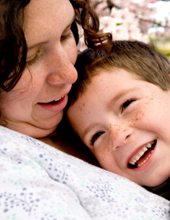About SOCiAL
Introduction and background
The Social Outcomes and Early Life Experiences Study (SOCiAL) is an exciting new piece of research which is currently being conducted by researchers within the Mental Health and Neurodegeneration Research Group at the University of Manchester with funding from the Waterloo Foundation.
The main aim of SOCiAL is to improve understanding of how and why children who experience adversity in their early lives sometimes go on to show emotional and behavioural difficulties that persist despite subsequent improvements in their care (i.e. through adoption or fostering).
This is a very important task since some of these children may suffer poor long term adjustment and are arguably one of the most vulnerable groups within our society today.
Better understanding of these difficulties could help us to identify new targets for intervention and improved methods of assessment.
Key objectives
Our project is particularly concerned with characterising the pattern of social difficulties specific to early environmental adversity. It is based on emerging evidence that the difficulties seen in some children may represent fundamental social impairments of a similar quality to autism spectrum conditions (Green, 2003).
There are four key objectives:
- To better characterise the nature of social difficulties and functioning in children who have experienced early adversity.
- To learn about the underlying cognitive mechanisms (i.e. thought processes) of social functioning in these children.
- To learn more about the complex interplay between genetics and the environment in contributing to social difficulties.
- To assess longitudinal stability of social difficulties and examine associations with long-term functioning and placement outcomes in adopted children.
Participants
Between June 2011 and June 2012 recruited families to take part in SOCiAL.
We recruited three groups of participants:
- A group of adopted children.
- A group of children from mainstream primary schools.
- A group of children with behavioural problems from child and adolescent mental health services (CAMHS).
All children were be aged between 6 and 11 years old.
We are currently re-contacting the adopted and primary school groups for the follow-up phase of the study
Long term outcomes and adjustment: Two year follow-up
A two year follow-up of the adopted and community comparison children will assess longitudinal stability of social difficulties and further examine associations with long-term functioning and placement stability in adopted children.
Assessments
We are interested in social behaviour, social understanding and behavioural adjustment in children who have had different kinds of early experiences and care.
We complete a range of assessments with parents/guardians, teachers and the children themselves at one point in time to get a 'snap shot' of how the children are doing at this time. These are now being completed again for the follow-up. All of our assessments are widely used in research and clinical practice and have been reviewed by the University of Manchester research ethics committee (ref 10405).
We then compare children who are looked after and adopted with the children who are recruited from primary schools and CAMHS to see if there are any subtle differences between the groups. This tells us what difficulties or strenghts children in each group have when compared to the other.
We might also find particular stengths which are important for other aspects of behaviour, i.e. which may 'protect' against mental health problems.
DNA and the environment
We are also interested in looking at how genes and the environment interact to help protect children from experiencing difficulties or place them at a greater risk of problems.
In order to do this, we will collect two saliva samples from each child. This simply involves the child spitting in a special tube. The tubes will be labelled with the child's unique identification number and sent straight to a specialist laboratory where the DNA will be processed.
We will not provide any feedback on the individual results of DNA analysis and we will not screen for any genetic diseases etc.
Further information and contact
Further information and details of how to take part can be found on the information for follow up page.
If you have any questions at all you can contact us
Thank you for your interest and we hope that you enjoy reading about our research.
This study has been approved by the University of Manchester Research Ethics Committee: Reference 10405

